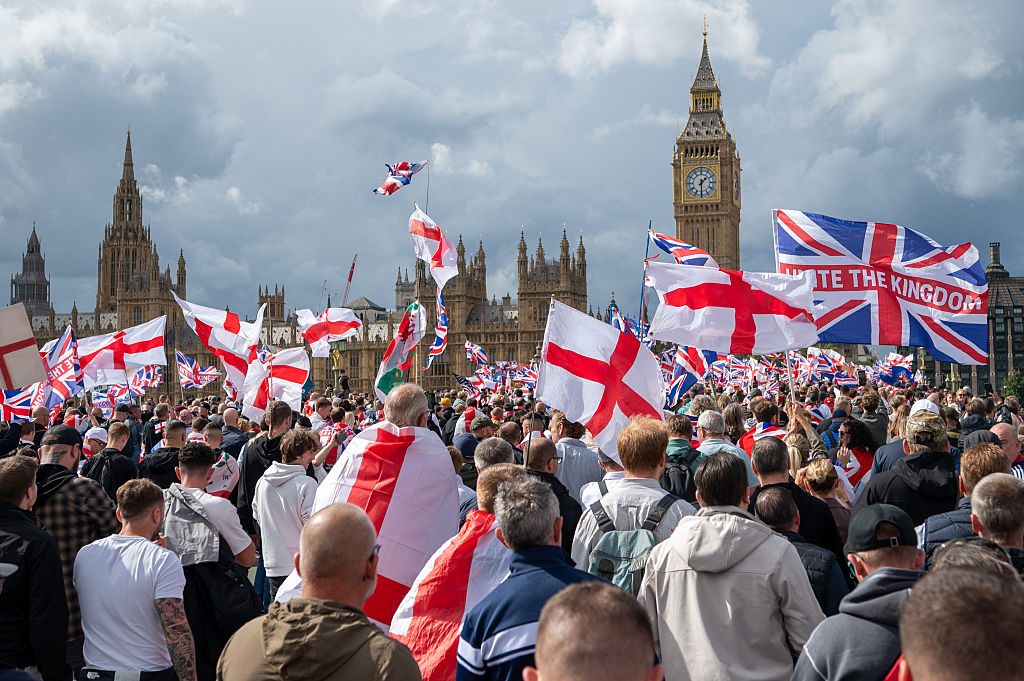Believe it or not, an old friend of mine took part in one of the marches in London this weekend to “Unite the Kingdom”. We attended middle school together and grew up on the same Eastern District council estate in Northampton. When I asked him why he went along to the protest, he gave me two answers. The first was that “the Government doesn’t listen to us.” The second struck me more deeply: “I want to feel proud of my country again.”
On the day, my friend wore a Union Jack rather than a St George’s Cross, as he felt the English flag had been hijacked by racists. He wasn’t there for Katie Hopkins, Elon Musk or any of the professional “grifters”, as he described them. He was there to feel part of something bigger, though he admitted there were plenty of, in his words, “assholes” present.
My friend is an electrician. He’s smart, and I know him well enough to know that he isn’t racist, though he’d insist he isn’t “PC”, either. He’s not a fan of Keir Starmer, but he also believes that Nigel Farage would be a disaster. He’s a bundle of contradictions, but aren’t we all? So, what box do we put him in? And what about the millions of Britons just like him? While some of those marching may hold unsavoury views, dismissing everyone involved as “racists” or “fascists” would be a massive mistake.
Clearly, this is about something bigger than immigration slogans or GDP numbers. For decades, we have hollowed out our national life, underfunding and undermining the very institutions that once brought us together. The Austro-Hungarian economist Karl Polanyi, in his 1944 book The Great Transformation, argued that when markets are “disembodied” from society — when land, labour, and life itself are treated as commodities — then society pushes back. He called this the “double movement”: people seeking to protect themselves, to reclaim dignity and meaning when everything solid seems to melt into air. When my friend showed me photos from Saturday, that is what I saw: not just anger, but a demand for belonging.
Collective experience has become practically obsolete; in its place is rising atomisation. Where once BBC programmes such as The Generation Game pulled in millions of viewers every Saturday night, giving us all something to talk about on Monday morning, now we watch Netflix, Disney+ and Amazon Prime, often alone in our algorithmic silos. High-level football used to be affordable and rooted in the local community; now it involves millionaires playing to boost the profit margins of billionaires. The NHS, the Post Office, the railways: all have been chipped away, run down, sold off or centralised, leaving ordinary people feeling powerless and disconnected.
Of course, some kind of Hovis-flavoured nostalgia for the Fifties isn’t the answer. Britain back then was often intolerant and deeply unequal. But what we’ve built since is a society which gives people little to hold in common, no collective story about who we are or what we stand for.
That’s likely one reason why my mate marched — not because he wants to turn back the clock, but because he wants to feel pride again. This pride is for a country that is inclusive, fair, and offers a role for everyone; it is for a country which has a respected place in the world, tackles grotesque inequality, and gives people something real to believe in.
Polanyi warned that when democracies fail to provide a humane alternative, the backlash can turn authoritarian. This is how fascism grew in the Thirties: not because everyone became a true believer, but because millions felt abandoned and looked for strength, identity, and meaning wherever they could find it.
If Labour and progressives don’t offer that story of renewal, if we don’t rebuild our national institutions, restore collective pride, and re-embed markets within society, the far-Right will do it for us in their own image. And by then, it will be too late.











Join the discussion
Join like minded readers that support our journalism by becoming a paid subscriber
To join the discussion in the comments, become a paid subscriber.
Join like minded readers that support our journalism, read unlimited articles and enjoy other subscriber-only benefits.
Subscribe